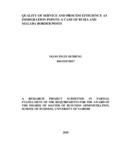Quality of Service and Process Efficiency at Immigration Points: a Case of Busia and Malaba Border Posts
Abstract
Service quality has been recognized as a major ingredient in the success of organizations
hence how they manage their service operations would eventually determine how they
performs in terms of efficiency. With good quality services offered to the customers the
organizations will have satisfied the customer needs hence this will eventually translate to
improved consumption of the products offered thus improved revenues would mean that
processes are efficient. The general rise in global trade has meant that there is a lot of
border movement hence the need of efficient clearance processes is seen as instrumental
to the success of this. With no known study that has tried to look at the correlation of the
quality of services offered at the border points of Malaba and Busia to the performance of
the processes which is efficiency this study was seen relevant to help in finding out this.
The study analyzed the services offered and tried to establish their relationship to the
efficiency of the processes in terms of the volumes processed and the time used in the
processes. The study used a case study and primary and secondary data was collected
where by questionnaires were used to collect primary data and the contents were
analyzed qualitatively and inferences were drawn to deduce the outcomes. The outcomes
were regresses to establish whether there exists a correlation between the variables that
were established. The findings gave an insight of the relationships of the quality of
services to the performance of the processes at the border points. It shows that
improvement in the quality of services in terms of the delivery processes helped to
improve the performances in terms of the processes efficiency. Though some challenges
were realized in terms of the implementation of the processes which could have affected
the way some consumers perceive the services, it was concluded that with proper
stakeholder involvement in developing the services the success rate can be improved.
Hence the recommendations were that there should be constant improvement of the
services by constantly analyzing the needs in the environment and also fully involve
stakeholders in the processes of developing the services. Therefore generally it was
concluded that quality of service has a positive relationship to the processes efficiency.
Publisher
university of nairobi
Rights
Attribution-NonCommercial-NoDerivs 3.0 United StatesUsage Rights
http://creativecommons.org/licenses/by-nc-nd/3.0/us/Collections
The following license files are associated with this item:


